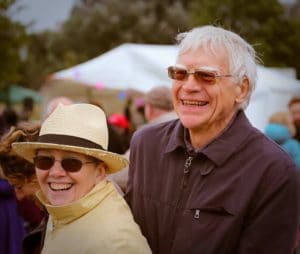Brenda and Stephen Whittle, PhD

Both Brenda and Stephen were born, into working class families, during World War 2 in Islington, London. They both retired in 2002. Stephen, for most of his working life, was a lecturer in Biology and Genetics at Goldsmiths University of London. He finished his career at The University of Greenwich. Brenda worked as a Laboratory Technician in several London Secondary Schools and also sometimes worked as Stephen’s Research Assistant.
In 2013, the Family noticed that Brenda was becoming very forgetful (forgetting names and repeatedly asking the same questions). She was referred to the local NHS Memory Clinic. Brenda was resistant to the idea that her memory problem was anything more than just an ageing phenomenon, and she was diagnosed with Mild Cognitive Impairment. However, her memory continued to deteriorate and in early 2015, Stephen insisted that she be re-referred to The Memory Clinic, and Brenda was diagnosed, in April 2015, with Alzheimer’s Disease, and was immediately given Donezepil. She was initially very angry and difficult to live with, but by the summer of 2015, Brenda had come to terms with her condition. “It has rather been like ‘coming out’”, she said to Stephen, “It took me a long time to accept that I had a problem, but now I am not so worried and angry with myself and particularly you”. After “coming out”, she was happy to discuss her situation with others. Now Brenda says she “Goes with the flow”.
Stephen has been impressed by the help and advice provided by the Haringey Memory Clinic. Brenda attended a series of CST (Cognitive Stimulation Therapy) sessions and there is also a Club which she attends regularly. Stephen attends a Carer’s Support Group. The Alzheimer’s Society has provided much helpful advice and Stephen also participates in the Protect Study run by King’s College London.
Brenda decided to take part in a Research Study to test a new drug that might stop the progress of Alzheimer’s disease. After a three month screening process, Brenda was able to qualify for the Amaranth Drug Trial, and the two-year trial began in November 2015. There have been many visits to the Drug Trial Clinic, We do not know whether Brenda is on a high dose of the Drug, a low dose, or the placebo, and of course the trial will determine whether Amaranth does slow down or even halt the progress of the disease. Sometimes when Brenda feels good she is convinced that she is receiving the Drug and that it is working. At other times, when she realizes that her memory is no better or getting worse, she fears that she is on the Placebo. There is a strict protocol for taking the Amaranth tablet every day but Brenda rarely gets annoyed during the three hour periods when she cannot eat nor drink tea. As part of the Trial, Brenda is monitored very closely by the Doctors at Recognition Health. Brenda and Stephen do have the consolation that they are making a contribution to the progress of medical science and that, if the Drug does work, all of the many hundreds of participants will be the first people to be given the Drug.
Brenda and Stephen, for over 15 years, have been Carers for a friend with Parkinson’s Disease, yet now Brenda has to be cared for by Stephen! Stephen has always been involved in local politics and community organisations, but now is having to slowly withdraw from his many commitments.
Brenda and Stephen have a daughter, son-in-law and three grandchildren who live nearby and who provide support when needed, as do Brenda’s two brothers and sister.
Brenda and Stephen have been happy to act as media volunteers for Alzheimer’s Research UK.
